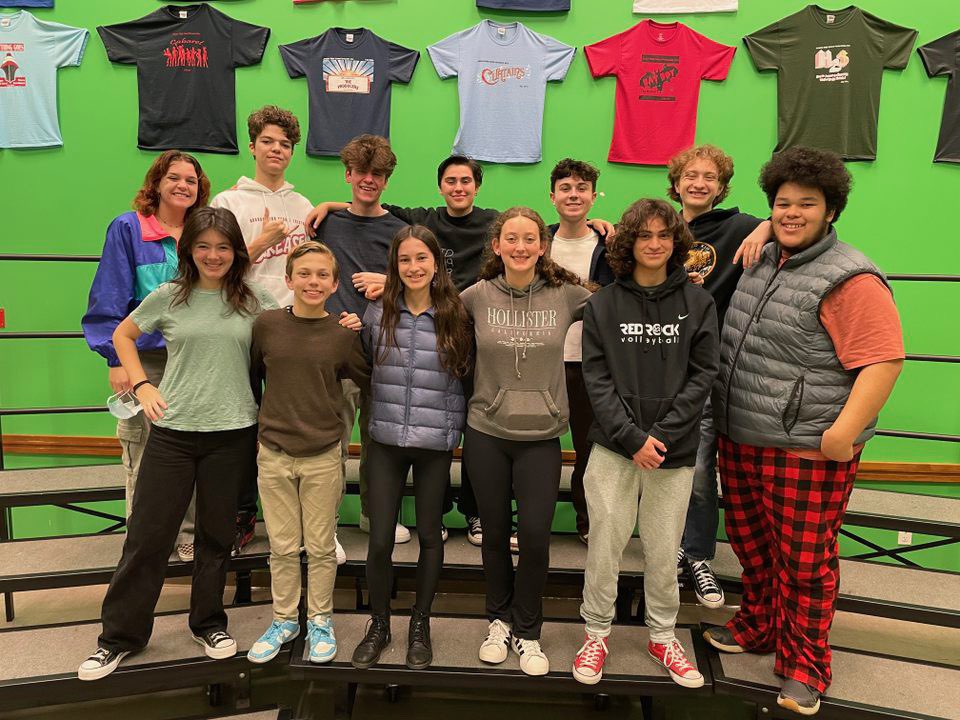
On Feb. 16, the curtains opened on the Improv Olympics, featuring Aragon and Hillsdale’s improv teams from 7-9 pm. The event highlighted improvisers’ quick thinking through a series of sketches. The performances were evaluated by assessing audience applause, resulting in Aragon’s win with a final score of 60 to 55 against Hillsdale’s team.
The ten-minute sketches covered themes ranging from mystery to humor.
Sophomore Samantha Green discussed the variability of the improv team..
“The joy of improv is that it can kind of be whatever you want it to be,” said Green. “You learn how to adapt to different situations.”
Hillsdale sophomore Jonah Immanuel elaborated on the benefits he found in improv.
“Improv is the place where I can go to for two hours and just put [everything] out on stage. I don’t have to worry about life. I don’t have to worry about my homework. I can just be there,” Immanuel said. “It’s such a fun, beautiful thing to do.”
Junior Diego Marenco discussed the unifying nature of improv.
“It’s really important that everyone has a shared goal,” Marenco said. “It brings people together.”
Through a series of spontaneous sketches and scenes, participants demonstrated their ability to think on their feet by adapting fictional characters or playing real people.
“We did a scene at the end with everybody from both teams, which was definitely chaotic,” Green said. “I got to be Taylor Swift.”
Actors prepared for their improvisational pieces twice a week, from 6:30-9 pm, consisting of working on how to build an improv scene and practicing games that may be used throughout the Olympics.
“We worked on how to build a setting so when we get on stage we know where to go, since we normally get suggestions from the audience,” Green said.
In “Arms,” a game Aragon initially played, two actors would stand behind fellow team members and replace their arms with their own during scenes. Players would then act as if their arms were hidden or non-existent, engaging in various actions initiated either by themselves or by volunteers from the audience.
Junior Macen Adams shared the challenges involved in improvisational performances.
“It’s not really a competition, it’s a fun way for teams to practice with a… live audience,” Adams said.
Throughout the evening, audience members were encouraged to participate by offering suggestions or prompts for the performers to incorporate into their scenes.
“I really enjoyed how random [and] surprising [improv is]. Every now and then, someone will throw something in and it’ll be like, ‘Oh I didn’t see that coming,’“ said freshman Charlotte White.
Additionally, Hillsdale’s improv team, known as “HIT Squad” participated in “Freeze!” When a freeze was called, all performers halted in their current positions. To continue the scene, a new performer would sing their internal dialogue while in the same setting, in this case, working in a tax office. Audience members reflected on their performance.
“Hillsdale’s ‘taxes’ game was kind of dry,” White said. “It didn’t really resonate [and] it was a bit of a drag…Hillsdale was very literal with how they did their plays.”
Improv theater is characterized by its emphasis on quick thinking and collaboration among performers.
“Improv is extremely collaborative, no scene has one person in it,” Immanuel said. “It’s always looking at your partners, at the group, seeing what everybody is trying to say. Then you know, you just go with the flow.”
Without scripts or preparation, actors must rely on their instincts and creativity to navigate each scene.
“It was challenging performing with the newer actors [because] it’s hard splitting up a role [and] stage time,” Marenco said.
Rating performances added to the spontaneity of the performance, fostering a sense of community and shared experience, a common sentiment amongst performers.
“HIT Squad has such great energy, the audience is so positive and always so much fun,” Green said. “It’s an easy environment to perform in because everyone’s clearly there to have fun.”
Hillsdale and Aragon have also started hosting joint practices, allowing teams to get a better feel for different improvisational techniques and styles.
“It’s been really refreshing because we get to see how those different improvisers put their own spin on [games], especially not in a competitive environment or a show,” Immanuel said. “Even though we want to win, there’s an underlying respect for one another.”
Wrapping up the Improv Olympics for the school year, Aragon Drama prepares for “The Murder On the Orient Express” scheduled for Mar 21-24.




